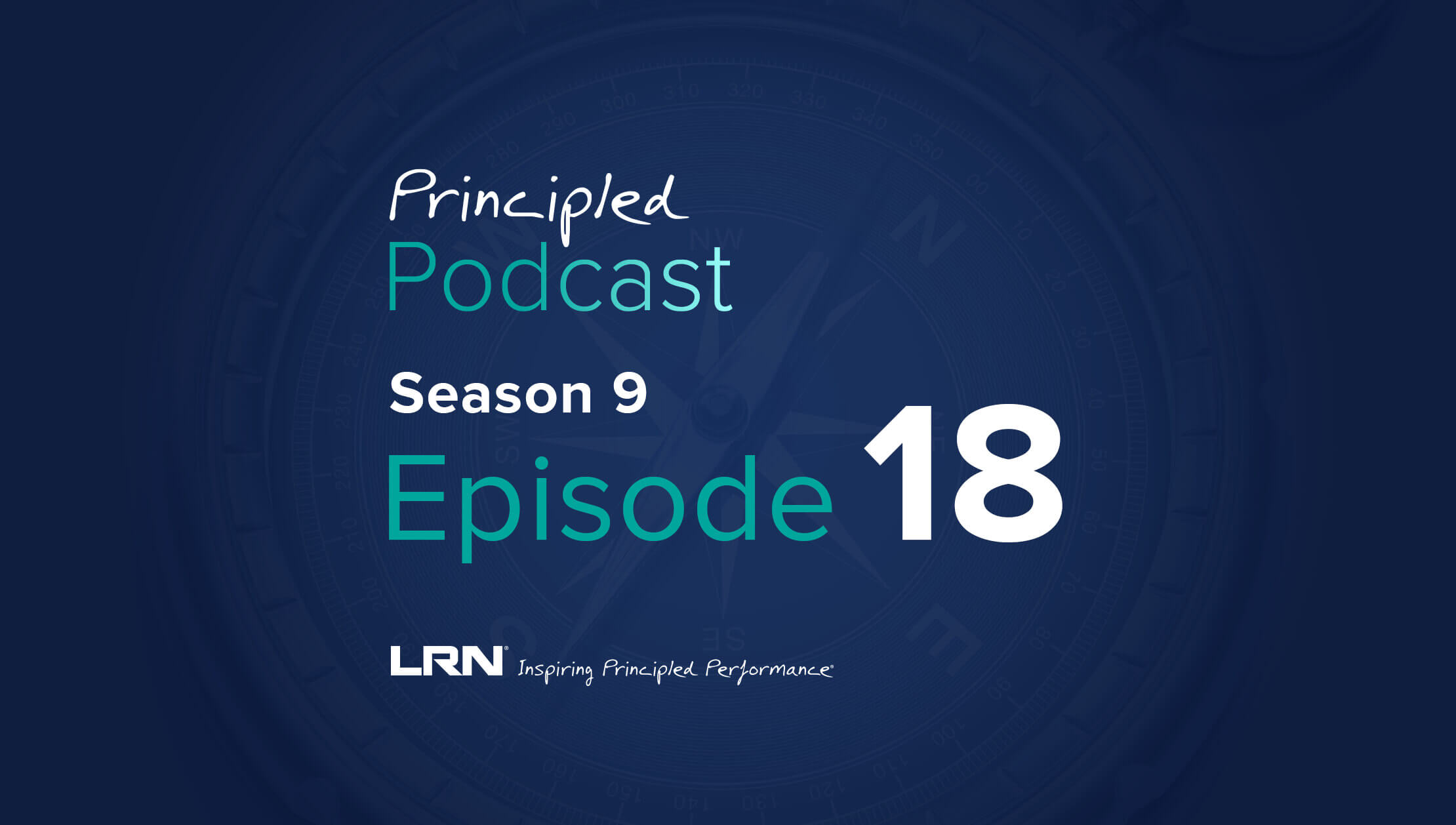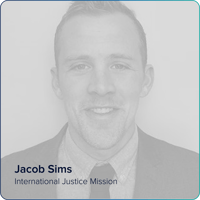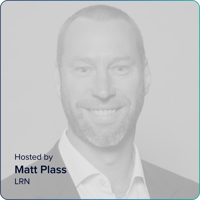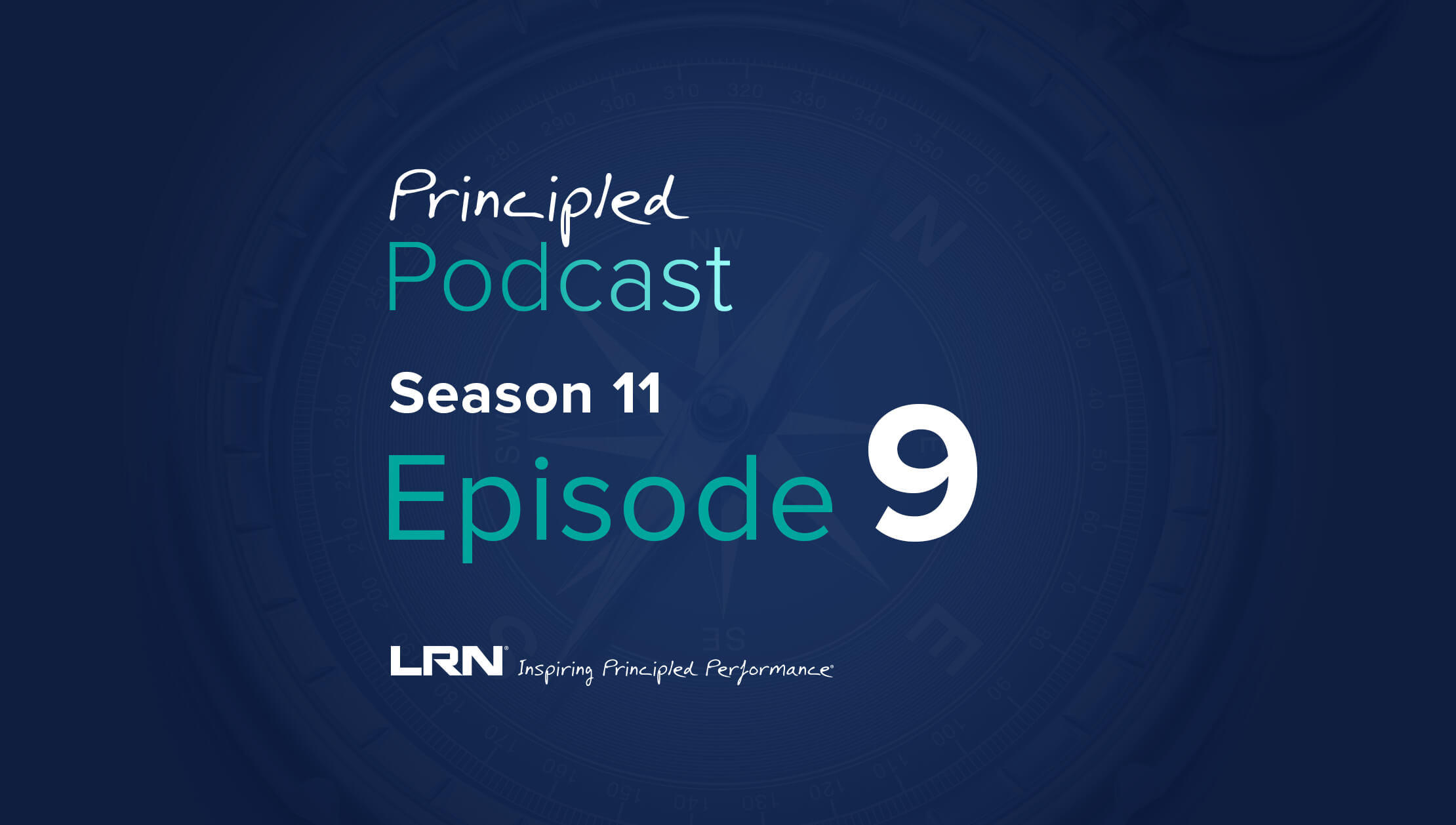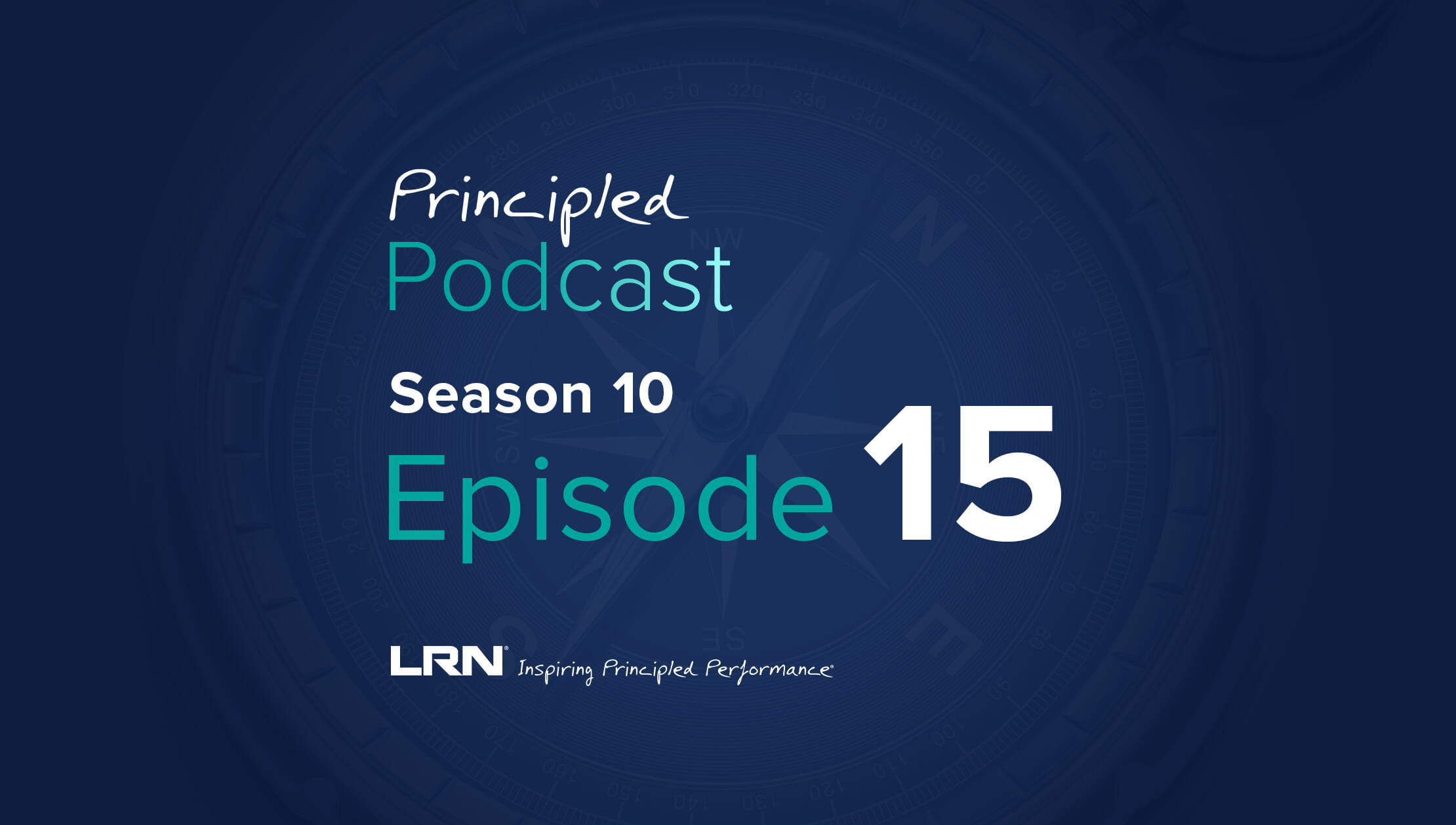What you'll learn on this podcast episode
Modern slavery is on the rise, and criminal organizations are becoming more sophisticated about it. According to the International Labor Organization more than 28 million people experienced forced labor in 2021. That’s equivalent to the entire population of Australia. What can be done about it? How can ethics and compliance professionals make a difference? In this episode of LRN’s Principled Podcast, LRN Global Head of Segments, Matt Plass, talks with Jacob Sims from the International Justice Mission in Cambodia, who has been working actively to address modern slavery in southeast Asia. Listen in as the two discuss how Jake’s work as county director combines investigators, lawyers, social workers, and programmatic and operational staff in the fight against violent labor exploitation.
Where to stream
Be sure to subscribe to the Principled Podcast wherever you get your podcasts.
Guest: Jacob Sims
Jacob Sims has worked on human rights and development challenges facing Southeast Asia for over a decade—spanning issues from governance in the Philippines to internal displacement in Northern Myanmar to labor rights in Cambodia. He currently serves as country director of International Justice Mission (IJM) Cambodia where he leads a team of investigators, lawyers, social workers, programmatic and operational staff in the fight against violent labor exploitation. Concurrently with his role at IJM, he serves as a non-resident fellow at Duke University’s Kenan Institute, a leading research center working to understand and address real-world ethical challenges facing individuals, organizations, and societies worldwide. Sims’ team at IJM mounted one of the earliest programmatic responses to the human trafficking epidemic emerging within scamming compounds in Cambodia and have helped facilitate the rescue of over 100 individuals to date. In recent months, analysis from Sims on the emerging global phenomenon has featured in The Economist, The Guardian, LA Times, Al Jazeera, VICE World News, Sydney Morning Herald, ProPublica, Channel News Asia, amongst many others.
Matt Plass is the global head of segments at LRN. He was formerly chief executive officer with Interactive Services, where he led the executive team responsible for bringing Interactive Services’ award-winning integrity, ethics, and compliance learning solution to market. Matt has an extensive background in e-learning, blended learning, classroom education and learning design for adult audiences and has engaged with numerous Fortune 500 organizations in the design of learning solutions for global audiences. He provides advanced learning expertise to partners, and is a regular speaker at learning and development conferences. Matt led Interactive Services through its acquisition by LRN in 2020. He lives in Devon, England.
Principled Podcast transcription
Intro: Welcome to the Principled Podcast brought to you by LRN. The Principled Podcast brings together the collective wisdom on ethics, business and compliance, transformative stories of leadership and inspiring workplace culture. Listen in to discover valuable strategies from our community of business leaders and workplace change makers.
Matt Plass: You are probably familiar with the concept of modern slavery. You'll have heard that it's on the rise and that criminal organizations are becoming more sophisticated about it. According to the International Labor Organization, more than 28 million people experienced forced labor in 2021. That's the entire population of Australia equivalent.
So, what can be done about it? How can we, as ethics and compliance professionals, make a difference? Hello, and welcome to another episode of LRN's Principled Podcast. I'm your host for today, Matt Plass, Global Head of Segments at LRN, and today I'm joined by Jacob Sims, the country director of the International Justice Mission, Cambodia, who's been working actively to address modern slavery in Southeast Asia.
Jake is a real expert in this area. He's worked on human rights and development challenges facing Southeast Asia for over a decade, spanning issues from governance in the Philippines, to internal displacement in Northern Myanmar, to labor rights in Cambodia. He currently leads a team of investigators, lawyers, social workers, programmatic and operational staff in the fight against violent labor exploitation.
Jacob's team at IGM mounted one of the earliest programmatic responses to the human trafficking epidemic emerging within scamming compounds in Cambodia, and they have helped facilitate the rescue of over 100 individuals to-date. So Jake, thanks for coming on the Principled Podcast and continuing the conversation we started at the ACAMS Conference in Singapore last month.
Jacob Sims: Thanks, Matt. Great to be here and great to be speaking with you again.
Matt Plass: Wonderful. So first of all, Jake, tell us about yourself. Where are you from? What's your background? How did you get involved with International Justice Mission?
Jacob Sims: Thanks, Matt. I'm from the US, and actually started my career as an IGM intern back in 2009 at their headquarters in Washington, DC. That intern experience opened my eyes to the violent oppression which consumes the lives of billions of people around the world. I was so fascinated and compelled by what I learned that summer that I continued moving in the direction of a vocation in the human rights and development space. And that journey ultimately took me to many different contexts around the world, contributing to efforts to respond to some of these big human challenges.
And I re-encountered IJM's work in 2018, almost by coincidence while working on a project in Northern Columbia, looking at issues of violence against vulnerable migrant workers coming over the border from Venezuela. So, IJM was considering opening an office in Columbia around the same time, and I had a chance encounter with their regional president, Pablo Villeda, which put IJM back on my radar. And about a year later, Pablo suggested I apply for my current role in Cambodia, and it's been a really terrific fit.
Matt Plass: Great. And one of the things, Jake, that struck me in our conversation at ACAMS Singapore was the idea that the perpetrators of fraud are often themselves victims of modern slavery, so you have, in effect, two or more victims associated with each crime. Now, maybe you can tell us a little bit more about that, how it happens, and at what kind of scale.
Jacob Sims: Sure, absolutely. This is actually a really unique case type for us at IJM, dealing with victims of what we call forced criminality. Essentially, people from around Southeast Asia, and increasingly the world, are being tricked en masse by fraudulent recruiting ads found on major social media platforms and traffic to Cambodia, to Myanmar, to Laos, several other countries. When they arrive, they're held against their will in large militarized compounds and forced to conduct scam calls, targeting folks from all over the world.
So, those who fail to comply with the managers of these compounds, or meet quotas, face really extreme physical abuse. In terms of scale, an exact estimate is sort of difficult to pinpoint, as is frequently the case in criminal industries. However, if you look at Cambodia alone, the Cambodian government estimated last year that as many as 100,000 people are working in this industry, and that matches well with IJM's observations from working in this space over the last several years.
Compounded with the evidence gathered from our witness testimonies would suggest that this industry is generating billions of dollars every year, and again, that's Cambodia alone. The scale is even more difficult to quantify in Myanmar due to the instability there, but there's reason to believe it could be twice or even three times as large in that context. So, within these compounds, violent labor abuse is really rampant, and the number of foreign nationals that are caught up in these compounds is truly astounding.
In IJM's response alone, we've directly assisted individuals from over 25 countries in the last few years. So, these are big stats, and obviously behind each of them is a story of individual human suffering and oppression, not to mention, as you mentioned before, the widespread downstream financial exploitation that's happening around the world.
Matt Plass: So it really is happening on a vast scale. If it's 100,000 individuals in Cambodia alone, at a minimum, instinctively you'd feel that government should be able to identify and shut this down, but obviously, that doesn't always happen. So, what is the role of government in preventing modern slavery, and where do you see governments perhaps failing to deliver on that role?
Jacob Sims: So accountability is absolutely key to ending this. And it is fair to say that this industry has emerged from some profound governance challenges, which has made the region really fertile soil for this particular form of violent criminality. Eradicating this is going to be difficult for governments; this is insanely lucrative and relatively straightforward to operate, even in an unstable context.
The real key, though, is for governments to ensure accountability. That needs to take place not just in the countries where this is occurring, but in the source countries. There are broker networks that are posting these fraudulent ads that are recruiting and luring their compatriots to travel overseas. There are traffickers that are facilitating these movements of people through transit countries, into those destination countries where the compounds actually exist.
And then finally, and most difficultly, you have compound owners and operational masterminds who are well-connected and operating within high degrees of impunity in these destination countries. So ideally, this accountability emanates from these local justice systems, but given the challenges inherent to transnational organized crime around the world, international law enforcement also has a pretty key role to play here.
I also, before we move on, I just want to touch on the fact that proper victim identification is also really, really vital here in terms of the government response. So according to UNODC, forced criminality is one of the most complex and fastest-growing forms of modern slavery. And this issue of forced scamming that we're talking about is likely the densest concentration of forced criminality on the planet.
And without proper victim screening in situations like this, we're risking re-victimizing people by detaining and arresting and charging and convicting the people who are engaged in these criminal activities, but under coercion. So, IJM is committed to building the capacity of these local justice system actors to effectively identify these victims as a key part of our mission to help governments protect people from violence.
Matt Plass: So some of this is around identifying victims, and some of it is around accountability. We do know that when authorities do act in the right way, we can see great successes here. I understand that recently in the Philippines, one of these compounds was raided and over 1,000 people were rescued. And in this case, I believe a victim's alert to the Indonesian Embassy was shared with the Philippine authorities who then took action. So, what else do you see in terms of how victims, and potentially witnesses, can raise the alarm, and then how these escapes are actually facilitated?
Jacob Sims: This is a new and emerging issue, so the channels for folks to request help are still emerging and formalizing. The people in these compounds, though, are often quite desperate given how brutal the circumstances are, and are using just about every channel at their disposal to find a way out.
So, our team at IJM has been responding to this issue for the last 2.5 years and have been contacted in just about every way imaginable. Folks are reaching out to our hotline, our main corporate email address, through other NGOs and the countries that we operate in, through relatives in other countries. We've helped rescue a number of people, actually, who first reach out to me or other staff members personally on social media. It's just whatever channel they have access to.
But in recent months, we have been encouraged to see that formal hotlines are being established by embassies and governments across the region, and these formal channels are becoming gradually more widely used. However, the barriers to folks reaching out still remains pretty high, because the physical abuse within these compounds is often perpetrated and targeted against the people who are trying to leave.
I would just say in conclusion to this answer, as the phenomenon continues to explode in size, really continuing to improve the level of coordination between governments, embassies, NGOs, other victim activist groups, is going to be really, really key here.
Matt Plass: Right. And if somebody has listened to this and perhaps doesn't know which channel they could use to speak up, is the IJM website a good place to start?
Jacob Sims: Yep, tip line at IJM.org is an absolutely valid place to start.
Matt Plass: Fantastic, thank you. So Jake, the listenership here, and our client base globally is largely business leaders who are in charge of workplace culture, ethics and compliance. Our research shows that workplaces with a strong ethical culture outperform others by up to 40%.
We all know the moral value here, but there's also a business value of doing the right thing. It's pretty clear, but spotting fraud and scams and human trafficking is not always easy. What are some of the things that business leaders can and should be doing in this space?
Jacob Sims: Yep. That's a great question, and the answer really depends on the specific industry we're talking about. For example, how to spot abuse in the phishing supply chain, another industry that we work in, looks totally different from how to root out for scamming. But in either case, this is going to start with an awareness and an openness to how your corporate platforms, products or supply chains might be facilitating various forms of abuse.
It also then requires a next step of willingness to turn to experts for advice on how to eradicate whatever you have identified. For example, in this space, the forced scamming space that we're talking about, you've got three main types of corporates whose platforms are being instrumentalized.
First, you've got telecoms and utilities providers in each of these countries. These corporations may not have an active stake in the compounds themselves, but major telecoms and utilities companies are ultimately providing the connection necessary to keep lights on in these cases. And the locations of these compounds are not a secret; they are public record, they're in the media all the time. And barring effective government regulations, self-regulation by these corporations taking a strong stance against criminal actors using their networks would make a really significant difference.
Second, you have financial institutions. We know that most of these scams are being perpetrated via various cryptocurrencies, but eventually that money finds its way into bank accounts in places like Cambodia, Myanmar and elsewhere. So these banks obviously have a responsibility here, but also, critically, banks around the world who partner with banks in these contexts have a responsibility. So, a greater effort by major financial institutions and/or international financial regulators to hold local banks and local financial systems accountable for fraud, systemic money laundering, is really key here.
And so lastly, just wrapping up to this, we also know that the vast majority of the human trafficking victims in this case type are recruited by fraudulent ads on social media platforms. These platforms can work actively to improve content moderation, they can spread awareness to their target populations that we know are being targeted by these scamming corporations, and IJM has been really encouraged by some of our initial partnership work with Meta towards these exact ends. But ultimately, instrumentalization of corporate products and platforms for criminal purposes is a really enormous part of this problem, and as such, corporations are going to need to play a part in the solution.
Matt Plass: Yeah, it sounds like there's a part to play for an awful lot of organizations and individuals here, and training and education will be part of that. Obviously, it's an important step the company can take. In fact, we've had a lot of requests to revise our modern slavery training offering, which we're doing right now to incorporate the very latest thinking on that subject.
It's also important, I think, and we discussed this last time, that organizations set the right tone from the top and they foster that speak up culture. One of our clients has taken this a step further. They're asking the company's leadership and middle managers to be very proactive in helping people speak up. They're asking direct questions about behavior in the field, things they might be seeing. They're reassuring employees that speaking up is the right thing to do, it's not perceived as negative. There'll be no retaliation, their insights are welcomed. So, it's about creating a culture and educating people, also. So thank you for that.
Now, my final question, Jake, I know that of particular importance for manufacturers, farming, fisheries, mining, logistics, really any company that's not strictly in the service business, is how to spot violators in the supply chain. And we know that isn't easy. Companies can make third party vendors attest to their commitment to a crime-free business operation; that's part of the Modern Slavery Act in the UK, for example. But what else should companies be doing to ensure their vendors are ethical and compliant?
Jacob Sims: Yeah, it's a great question, Matt. And I think you alluded to this above. Just to reiterate, culture is really key here. Setting a culture that is proactively engaged in combating abuse and exploitation is absolutely pivotal to any corporation's ability to fight this sort of abuse in their supply chains. And the work that LRN is doing in education and training, making sure that employees are clear on what's right and wrong, how to proceed with ethical decision-making, is really vital to improving these supply chains.
But at the core, though, IJM is an organization that believes that effective public justice system functioning is ultimately the best way to protect workers within supply chain. So as a corporation, anything you can do to invest in the local justice systems where your business operates will pay enormous dividends on behalf of at-risk workers. Moreover, large corporations we know wield significant power to influence and engage with governments on supply chain issues. So this influence should be used to emphasize worker safety, worker security against abuse, as one of their core values in deciding where to invest their resources and their capital development.
Matt Plass: Great. Jake, we're out of time, unfortunately. I'm so glad that we got to speak about this again. I really look forward to continuing the conversation, I'm sure we'll have that opportunity. This is a huge issue, it's not going away anytime soon, but thanks to organizations like the IJM and yourself, it does feel as if we're starting to see what those responses could look like. So, thank you so much for joining me on this episode.
Jacob Sims: Thanks so much for having me, Matt. Thank you for your support of our work.
Matt Plass: My name is Matt Plass. I want to thank you all for listening to the Principled Podcast by LRN.
Outro: We hope you enjoyed this episode. The Principled Podcast is brought to you by LRN. At LRN, our mission is to inspire principle performance in global organizations by helping them foster winning ethical cultures, rooted in sustainable values. Please visit us at LRN.com to learn more. And if you enjoyed this episode, subscribe to our podcast on Apple Podcasts, Stitcher, Google Podcasts, or wherever you listen. And don't forget to leave us a review.
Be sure to subscribe to the Principled Podcast wherever you get your podcasts.
